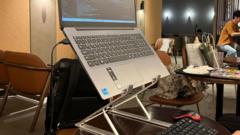In the bustling neighborhoods of Seoul, particularly in the affluent Daechi area, cafe owners like Hyun Sung-joo are facing a growing challenge with a unique group known as "Cagongjok." This term refers to South Korean students and remote workers who spend excessive amounts of time in cafes studying or working. Recently, one of Hyun's customers came equipped with two laptops and a six-port charger, occupying a single seat for an entire day. Such situations are prompting cafe owners to rethink their strategies for accommodating patrons without hindering other customers’ experiences.
Hyun expressed concern, revealing that with the high rent in areas like Daechi, it's becoming increasingly difficult to sustain business when a few customers monopolize seating for long durations. The trend of spending long hours in cafes has escalated throughout South Korea, significantly more than in Western countries, where cafes are often used for socializing as much as studying.
This month, Starbucks Korea announced regulations to curb the most extreme cases of workspace hogging. Their guidelines aim to address a minority of customers who set up elaborate workstations and leave multiple devices unattended, promoting theft risk. Instead of asking customers to leave, Starbucks staff will provide enhanced guidance to ensure a welcoming atmosphere for everyone.
Despite these measures, many moderate "Cagongjok" patrons still flock to Starbucks for their study needs. Anecdotal evidence suggests that while some customers have adhered to the new guidelines, others remain nonchalant, continuing to keep their belongings at tables for long periods. Mixed reactions have emerged from the cafe-goers; some welcome the changes, citing difficulties in finding seating, while others critique the policies as an overreach.
The rise of Cagongjok reflects a growing cultural trend in South Korea tied to its competitive society. Many young people express a preference for cafes over more traditional study spaces, such as libraries or home settings. Yu-jin Mo, a 29-year-old with a challenging upbringing, feels a cultural connection to cafes, sharing her belief that they provide a sense of comfort that libraries lack.
As discussions around Cagongjok progress, experts like Professor Choi Ra-young from Ansan University advocate for more inclusive public spaces that accommodate the needs of students and workers. She identifies the long study hours in cafes as a symptom of deeper societal pressures faced by young South Koreans. With almost 100,000 coffee shops in the country, understanding and adapting to these cultural habits is crucial for both cafe operators and their clientele.
















